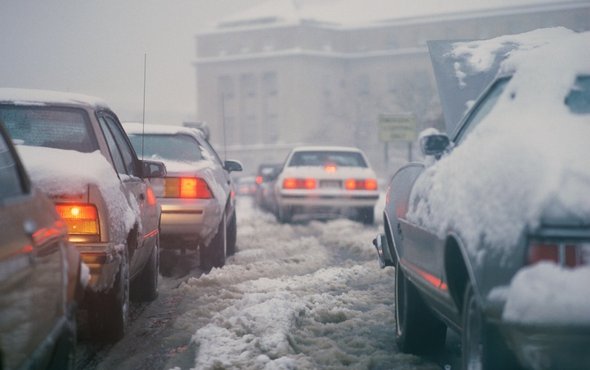(单词翻译:单击)
听力文本
This is Scientific American — 60-Second Science. I'm Christopher Intagliata.
February was unusually hot in the arctic. Thawing out temperature: 35 degrees Fahrenheit.
"It made big news when it got to 35, I don't know if that's t-shirt weather yet, but..."
Judah Cohen, a climatologist at Atmospheric and Environmental Research, a company that does consulting on weather and climate. "The arctic relatively is a much warmer place than it used to be."
Over the last few decades, the arctic has heated up two to three times faster than the rest of the planet. But in the same period, Eurasia and the northeastern U.S. have been on a cold streak. With some serious cold air and snow.
(CLIP: News montage: "Snowmaggedon... Snowpocalypse")
Climate-change-denying politicians like to point to the cold snaps as some sort of proof global warming is not happening. But a new analysis of more than six decades of daily temperature and snowfall data by Cohen and his team suggests arctic heat waves may actually be linked to severe cold weather at lower latitudes... perhaps through the polar vortex.

"What happened I think, we get warmer arctic in general kind of favors these polar vortex disruptions. And when you get a polar vortex disruption, warm air from the lower latitudes rushes in to the arctic, and you can get extreme warm events like we saw in February. But then the cold air that's normally locked up over the arctic gets displaced and it heads to lower latitudes. It's all connected, I think it's all part of the same phenomenon."
The details are in the journal Nature Communications.
Important caveat: this research is just an observational study. So it doesn't show a definite mechanism for a warm arctic causing more snowpocalypses. But if further studies bear this connection out, perhaps it'll kill the idea that cold weather means no climate change... and help keep snowballs off the senate floor.
Thanks for listening for Scientific American — 60-Second Science. I'm Christopher Intagliata.
参考译文
这里是科学美国人——60秒科学。我是克里斯托弗·因塔利亚塔。
二月份的北极异常炎热。解冻温度为35华氏度。
“温度达到35华氏度可是个重大事件,我不知道那个温度是否已经暖和到可以穿T恤,不过……”
大气和环境研究公司的气候学家朱达·科恩说到,该公司是天气和气候咨询公司。“相对而言,北极比以前温暖了很多。”
过去几十年中,北极温度的上升速度是地球其他地区的两到三倍。但是在同一时期,欧亚大陆和美国东北部地区却一直处于寒冷之中。同时还伴有强冷空气和强降雪。
(片段:新闻剪辑:“冰雪末日……末日暴雪”)
否认气候变化的政客们将寒流当作某种证据,以证明全球变暖没有发生。但是科恩和团队对60多年的日常温度和降雪数据进行的新分析表明,北极热浪实际上可能与较低纬度的严寒天气有关,这也许是极地涡旋造成的。
“一般来说,更温暖的北极增强了这些极地涡旋的破坏作用。当极地涡旋产生破坏时,来自较低纬度的暖空气会冲进北极,然后就会出现我们在2月份看到的那种极端温暖事件。不过之后,通常被封锁在北极上空的冷空气会被置换,并转向较低纬度地区。这一切都是互相联系的,我认为这些都属于同一种现象。”
详情请见《自然通讯》期刊。
重要提醒:这项研究只是观察性研究。所以它没有说明北极变暖导致更多暴雪天气的确切机制。但是,如果深入研究证实了这种联系,那也许会推翻“寒冷天气意味着没有发生气候变化”这一观点,并助于防止有人在美国参议院扔雪球。
谢谢大家收听科学美国人——60秒科学。我是克里斯托弗·因塔利亚塔。
译文为可可英语翻译,未经授权请勿转载!
重点讲解
重点讲解:
1. thaw out (使)解冻,融化;
She forgot to thaw out dinner, So we went out to dine.
但她忘了把晚餐解冻,我们只好出门果腹。
2. heat up 变热;
In the afternoon sun, the sand on the beach began to heat up.
在午后阳光的照射下,海滩上的沙开始变热。
3. lock up 把…锁起妥藏;
Please lock up these confidential reports.
请把这些机密报告锁起来。
4. bear out 支持,证实(某人的说法);
Recent studies have borne out claims that certain perfumes can bring about profound psychological changes.
最近的研究证实了有些香水可以引起深刻心理变化的说法。


